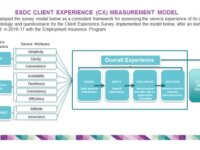To encourage data-driven decision making in public sector, University of Latvia and Microsoft Innovation Center developed a “Data challenge” platform and methodology. Aim of the initiative is to bring together teams of public sector officials and data analysts and in few weeks to create several AI solution prototypes for a specific public sector challenge giving the organisation an opportunity to explore innovative, data-driven solutions that they eventually can develop and implement in…
Innovation Tag: Process Improvement/Simplification
Community Connects is a pilot project that came out of the Transportation Innovation Lab. Problem/Opportunity: Cape Breton Regional Municipality (CBRM) is a region with high levels of poverty and unemployment. Innovation: Taxi service, doorstep pick-up, defined drop-off points, flat rate: $7 seat. Why innovative? In short, the approach (social innovation lab) and those that were engaged (first-voice participants).
The Client Experience Measurement Survey Model was developed by Employment and Social Development Canada to gather and analyse client feedback to improve service delivery to its clients. Canadians have been able to express their views on government programs and services, which have informed the way programs and services are designed and delivered. The survey allows the tracking of service satisfaction, ease of access, effectiveness of service delivery, and the experience of particular programs…
With a citizen-centric approach and a strong focus on co-creation, SIMPLEX is a simplification and modernization program focused on improving public service efficiency and designed to facilitate the citizens and businesses everyday life, and their interaction with the public administration.
Launched in 2006, it had several editions since then and resulted in the implementation of hundreds of initiatives that cut red tape, reduced context costs and used ICT to deliver better public services.
The MSIP Observatory is an interactive tool presenting spatial data of the City of Krakow useful for residents, investors, tourists and anyone interested in our city. The map consists of many layers presenting different kinds of information i.e on architecture and urban planning, nature protection and ecology, administration and security, tourism and history of the city. It's interactive and user-friendly and it implements the idea of open government and open data.
The integration of health and social care was seen by the Scottish government to require support to ensure that benefits of both national and local data and knowledge were able to be shared across two very different cultures and service providers to jointly develop more appropriate services for local populations.
LIST using their expertise in analytical work was seen as a way to develop a sound evidence base to allow decision makers to develop effective services.
The Exchange was developed to raise awareness in tourism industry on the importance of serving local food and drinks even in urban destinations (Ljubljana). The project objective is to positively affect the living standard of local farmers whereby quality and quantity of local food in hotels and restaurants will increase. With this project, Ljubljana has successfully and uniquely linked tourism sector and local agriculture to bolster sustainable economic growth and create new opportunities.
The Government of Tanzania has implemented a budgeting solution, developed with Isidore, for the collection, analysis and reporting of public revenue and expenses. The budget process is complicated from having diverse streams of revenue and expenses including donor funding, project outcomes, staff and capital works, which must be input by all Ministries and their personnel who are geographically dispersed. The final consolidated results are required in time for Parliament to ratify.
The Specialized Inspection Agency of Tuv Province and the Government of Mongolia Feasibility Study and piloted a project called “Counterfeit drug detection using Blockchain and AI” to eliminate fake drugs from the market, and save the thousands of lives. The project will increase safety and transparency of the drug industry, tracing the pharmaceutical supply chain in Mongolia, as well as globally.
HubGov is an interinstitutional program of innovation in Government that has the participation of institution from the three spheres and three powers. Through a learning trail in innovation and intrapreneurship skills, each institution comes up with a complex challenge and at the end of the program presents a solution proposal to this challenge.





